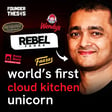
Healing The Startup Ecosystem: An Investor's Contrarian View | Dr. Aniruddha Malpani (Malpani Ventures)
"At the end of the day, I only care about process. I can't care about outcomes."
This core philosophy from Dr. Aniruddha Malpani highlights a powerful mindset applicable to both medicine and angel investing. He emphasizes that while outcomes (like getting pregnant or a startup succeeding) involve uncertainty, focusing on a sound, ethical process is what truly matters and is within our control.
Dr. Aniruddha Malpani is a pioneering IVF specialist in India, co-founding one of the country's early IVF clinics over 30 years ago. Beyond helping build families, he's a prolific author, a long-term stock market investor, and an active, outspoken angel investor through Malpani Ventures, typically investing between ₹50 lakhs and ₹2 crores in early-stage startups. His journey reflects a unique blend of medicine, entrepreneurship, and principled investing.
Key Insights from the Conversation:
- Ethics Over Everything: Building a successful medical practice and investment portfolio without compromising on integrity or giving kickbacks.
- Information Therapy: The crucial role of educating patients and the power of transparency in building trust.
- Process Over Outcome: Why focusing on the quality of your actions is more important than worrying about uncontrollable results, in IVF and investing.
- Contrarian Angel Investing: Seeking learning over ROI, making contrarian bets with patient capital, and betting on the jockey (founder).
- Learning from Failure: Embracing early investment losses as "priceless learning" to refine future strategy.
- Adding Value Beyond Money: Acting as a 'kindergarten teacher' for startups, focusing on governance, discipline, and long-term thinking.
- Healing the Ecosystem: The responsibility to call out unethical practices in both healthcare and the startup world.
Chapters:
- (0:00) Introduction: The Founder Thesis
- (2:10) Meet Dr. Malpani: IVF Specialist & Angel Investor
- (6:09) Bringing IVF to India: The Entrepreneurial Start
- (11:33) Information Therapy: Empowering Patients
- (16:07) Building the Clinic Ethically: No Kickbacks Allowed
- (21:11) From Professional Income to Passive Wealth
- (30:56) Angel Investing: Failures, Learnings & Contrarian Bets
- (39:43) The Malpani Ventures Investment Philosophy & Process
- (54:04) Adding Value Beyond Capital: Mentorship & Governance
- (1:02:30) Calling Out the Ecosystem: Byju's & LinkedIn Controversy
- (1:08:07) Betting on the Jockey: Founder Traits That Matter
- (1:13:11) Legacy: Healing Sick Systems & Process vs Outcome
Hashtags:
#FounderThesis #DrAniruddhaMalpani #MalpaniVentures #AngelInvesting #StartupIndia #IndianStartups #EthicalInvesting #PatientCapital #IVF #HealthcareInnovation #Entrepreneurship #VentureCapital #StartupFounder #ProcessOverOutcome #ContrarianInvesting #StartupAdvice #InvestInIndia #ImpactInvesting #MedTech #EdTech #StartupCulture #Bootstrapping



















